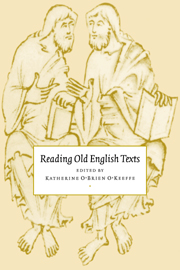Book contents
- Frontmatter
- Contents
- List of contributors
- List of abbreviations
- Note on the text
- Introduction
- 1 The comparative approach
- 2 Source study
- 3 Language matters
- 4 Historicist approaches
- 5 Oral tradition
- 6 The recovery of texts
- 7 At a crossroads: Old English and feminist criticism
- 8 Post-structuralist theories: the subject and the text
- 9 Old English and computing: a guided tour
- Suggestions for further reading
- Index
3 - Language matters
Published online by Cambridge University Press: 18 December 2009
- Frontmatter
- Contents
- List of contributors
- List of abbreviations
- Note on the text
- Introduction
- 1 The comparative approach
- 2 Source study
- 3 Language matters
- 4 Historicist approaches
- 5 Oral tradition
- 6 The recovery of texts
- 7 At a crossroads: Old English and feminist criticism
- 8 Post-structuralist theories: the subject and the text
- 9 Old English and computing: a guided tour
- Suggestions for further reading
- Index
Summary
Language-based approaches to the study of Old English go back to the earliest days of Anglo-Saxon studies, when in the sixteenth century scholars like John Joscelyn and Laurence Nowell took the Grammar and Glossary that Ælfric compiled to teach novices Latin through Old English and used it in reverse to teach themselves Old English through Latin. As collaborators with Archbishop Matthew Parker, Joscelyn and Nowell were leading figures in a project to glean evidence supporting the antiquity of Reformation doctrine from Anglo-Saxon manuscripts. Their efforts led, among other things, to the publication in 1566 or 1567 of A Testimonie of Antiquitie, shewing the auncient fayth in the Church of England touching the sacrament of the body and bloude of the Lord here publikely preached, and also receaued in the Saxons tyme, aboue 600 yeares agoe. It contains the first printed texts in Old English, most notably and controversially Ælfric's Sermon on the Sacrifice on Easter Day, which was presented (after selective editing) as evidence against the doctrine of transubstantiation. But a less conspicuous part of this ambitious programme was the compilation of the first modern dictionaries and grammars of Old English. In the years since the Reformation the ideological motivations for pursuing Anglo-Saxon studies have changed considerably, but every period has continued to produce studies on Old English language. Today, if the number of recent publications on lexicography, grammar, syntax, and metrics is any indication, the field is undergoing something of a renascence.
- Type
- Chapter
- Information
- Reading Old English Texts , pp. 59 - 78Publisher: Cambridge University PressPrint publication year: 1997
- 5
- Cited by



